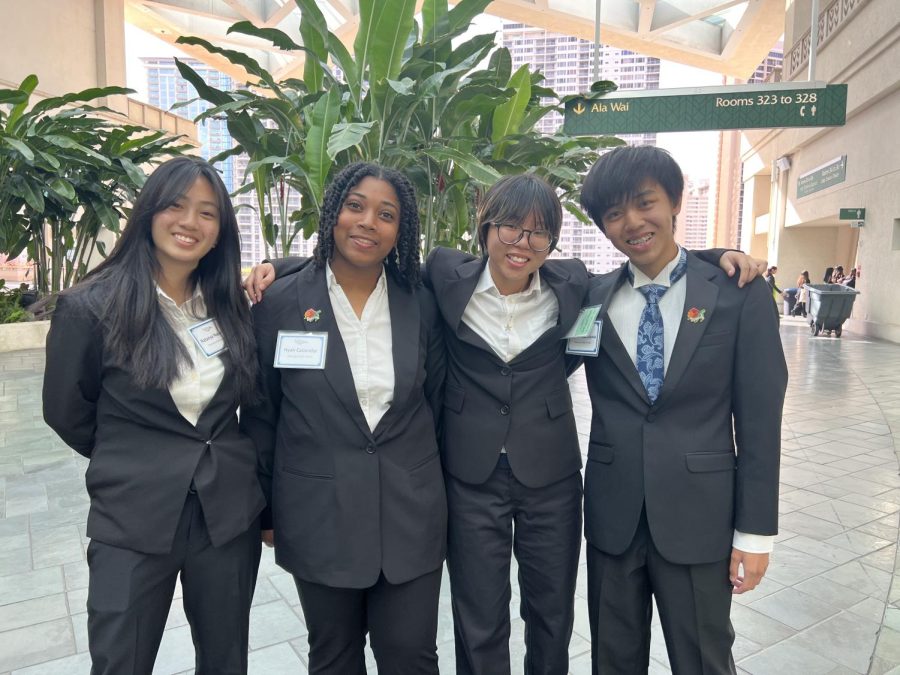A world of mindless consumption
March 8, 2023
Sophomores Nyah Callender, Peyton Kurosawa, Ronnie Lee, and Natanya Nakano competed in the event “Community Awareness” for HOSA SLC on March 1st. They received second place. Their project submission is shared below.
Teens in recent years are quickly attuned to the use of technology as the digital age advances. With this comes mindless consumption and in most cases, overconsumption of technology. As the years progress unhealthy precedents created by generations will be upheld.
Mindless overconsumption is a pattern of behavior in which individuals excessively and passively consume media or other goods without actively engaging with or critically evaluating the content or items being consumed. This type of consumption often stems from a desire for instant gratification or boredom and can result in a cycle of continuous consumption. It is often characterized by a lack of attention or thought and can lead to habituation or boredom.
With this continuous cycle comes consequences… In quarter three of 2021, the average time U.S. citizens spent on their phones was six hours and 58 minutes. Coming into 2023 we now spend just over seven hours looking at devices. A third of our day is spent looking at devices, not only is this unhealthy but the means of which we are using our devices are quite alarming. U.S. citizens spend a combined total of three hours and 41 minutes scrolling through social media and playing video games. Not to mention the recommended screen time for recreation is two hours.
Moreover, focusing on the social media aspect of mindless consumption, society faces a negative impact as a whole. Society is met with a decrease in important behaviors and an increase in damaging habits. Individuals will face decreased attention span, creativity, and critical thinking levels. Followed by, social isolation, an increase in sedentary behavior, disinformation of topics, and addiction.
Many more disfavorable habits are formed from just the mindless consumption of technology. By simply sitting in front of a screen the habit of mindless eating can be developed if not already there. Every day we make hundreds of food decisions, yet we are only aware of a mere fifteen of those decisions. Eating disorders can also result from spending unreasonable hours in front of a screen scrolling and analyzing the unrealistic standards set by society, distorting our minds; leading individuals to think more about their appearances rather than their well-being.
Further, not only do eating disorders begin to develop but the mental health of those trapped in the cycle of mindless overconsumption will begin to plummet. We are forced to witness events that impact our mentality negatively due to recent events including but not limited to: Covid-19, the Black Lives Matter Movement, the Stop Asian Hate Movement, and Raid on the White House. In addition to these events, there is also exposure to the conflicting ideas and hateful comments of others while online which may cause a variety of emotional disorders.
Moreover, with a simple search or click of a button we open ourselves up to a world of content. This content can be both graphic and vulgar. As we mindlessly consume, we lose our sense of critical evaluation which leads to the viewing of obscene videos. As we indulge in these topics our brain chemistry alters, resulting in watching these videos becoming second nature, ultimately leading to addiction. From this addiction, an escalation of content may ensue. Individuals may seek out increasingly graphic or extreme content in an attempt to satisfy cravings. Relationships with those who are close to you may start to deteriorate, resulting from shame, guilt, or isolation felt by feeding these addictions.
Lastly, mindless consumption of media can lead to the isolation of communities. With devices taking up much of our time in the day we’re less likely to have face-to-face interactions. Following these lessened interactions will decrease the number of opportunities individuals have to build healthy and meaningful relationships. Without these relationships and a lack of understanding for one another comes a lack of empathy, without the empathy we have for each other it leaves us empty husks, zombies to our devices.

